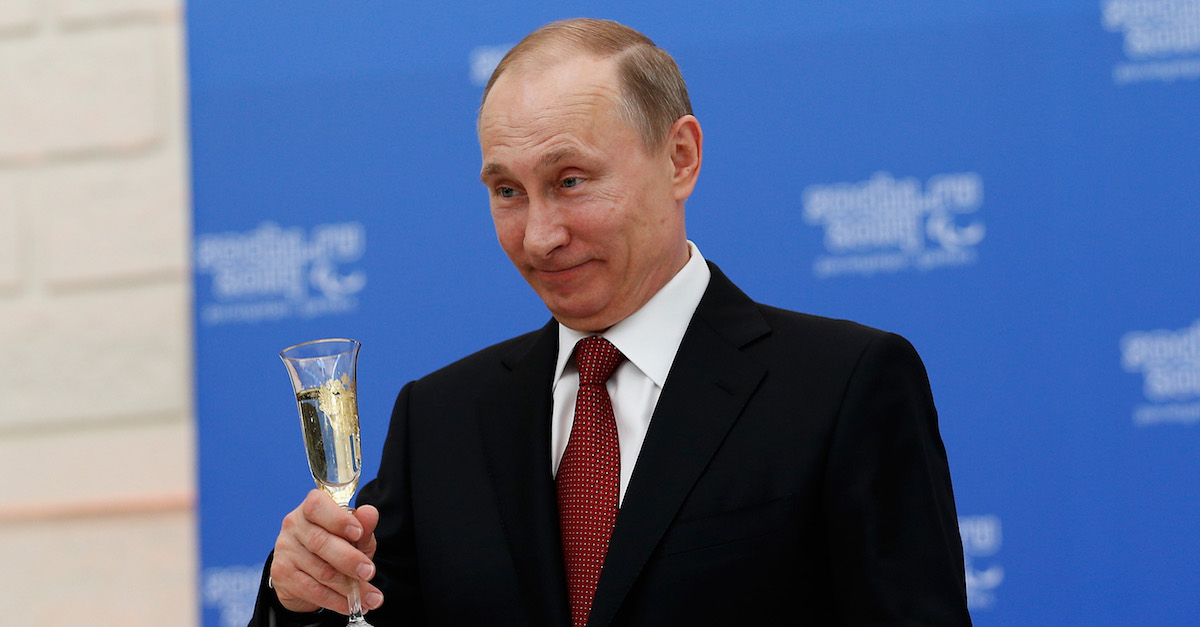
Russian President Vladimir Putin‘s Ministry of Justice officially responded last week in the Southern District of New York to the Democratic National Committee’s (DNC) lawsuit over the 2016 hack of internal emails that were subsequently dumped on WikiLeaks.
The gist of the response is this: Vladimir Putin is immune from all things.
“The Ministry of Justice of the Russian Federation has the honor to convey the enclosed Statement of Immunity by the Russian Federation as to the allegations contained within the Amended Complaint filed on October 3, 2018 by the Democratic National Committee in the ongoing proceedings in Democratic National Committee v. The Russian Federation et al.,” the letter began. “By transmitting this letter and the enclosed Statement, the Russian Federation respectfully does not enter an appearance in the litigation, does not waive its sovereign immunity under international law or the United States, statutory or federal common law, and does not submit to the jurisdiction of the United States District Court. The Russian Federation reserves all rights as a foreign sovereign State.”
Indeed, as ABC News noted, another part of the response actually allows the possibility that Russian military officers hacked the DNC, as alleged by special counsel Robert Mueller.
Twelve Russian military intelligence officers at Moscow’s Main Intelligence Directorate (GRU) were indicted for their alleged role in the hack. They allegedly used spearphishing techniques while “acting in their official capacities” to obtain log-in information of their targets with the intent of interfering in the election. The were also accused of hiding behind the fictitious persona Guccifer 2.0 to accomplish their illicit goals.
Here’s the relevant portion of the letter, saying something to the effect of “even if it did happen as you allege, sorry, but, you’re out of luck”:
Under the standard applicable within the U.S. legal system under Twombly and Iqbal, and assuming the truth of all pleaded allegations, the U.S. District Court lacks jurisdiction to adjudicate any claims against the Russian Federation based upon the DNC’s allegations.
Russia argued there is no exception carved into the Foreign Sovereign Immunities Act (FSIA) that would apply in this case.
“The FSIA provides that foreign sovereign States enjoy absolute jurisdictional immunity from suit unless a plaintiff can demonstrate that one of the FSlA’s enumerated ‘exceptions’ applies,” Russia said. “Any alleged ‘military attack’ is a quintessential sovereign act that does not fall within any exception to the FSIA or the customary international law or foreign sovereign immunity.”
“The Russian Federation’s sovereign immunity with respect to claims based upon such allegations is absolute,” the filing continued.
Interestingly, Russia turned all of this around on the U.S. by saying “But, but, but… What about the NSA?”
Indeed, the United States benefits significantly from the sovereign immunity that it enjoys (and U.S. officials enjoy) in foreign courts around the world with respect to the United States’ frequent acts of cyber intrusion and political interference. As current and former U.S. officials have acknowledged on many occasions, the United States-acting primarily through the National Security Agency (NSA) within the U.S. Department of Defense-is one of the most prolific practitioners of cyberattacks and cyber-intrusions on the planet.
At the end of the filing, Russia once again asserted absolute immunity and called this dispute a “fundamentally political and diplomatic issue.”
“For the reasons stated above, the Russian Federation is immune to the subject-matter jurisdiction of the U.S. District Court,” the filing concluded. “Moreover, the U.S. District Court should reject the DNC’s efforts to distort the meaning of the existing FSIA exceptions and to involve the judiciary in this fundamentally political and diplomatic issue.”
[Image via Harry Engels/Getty Images]